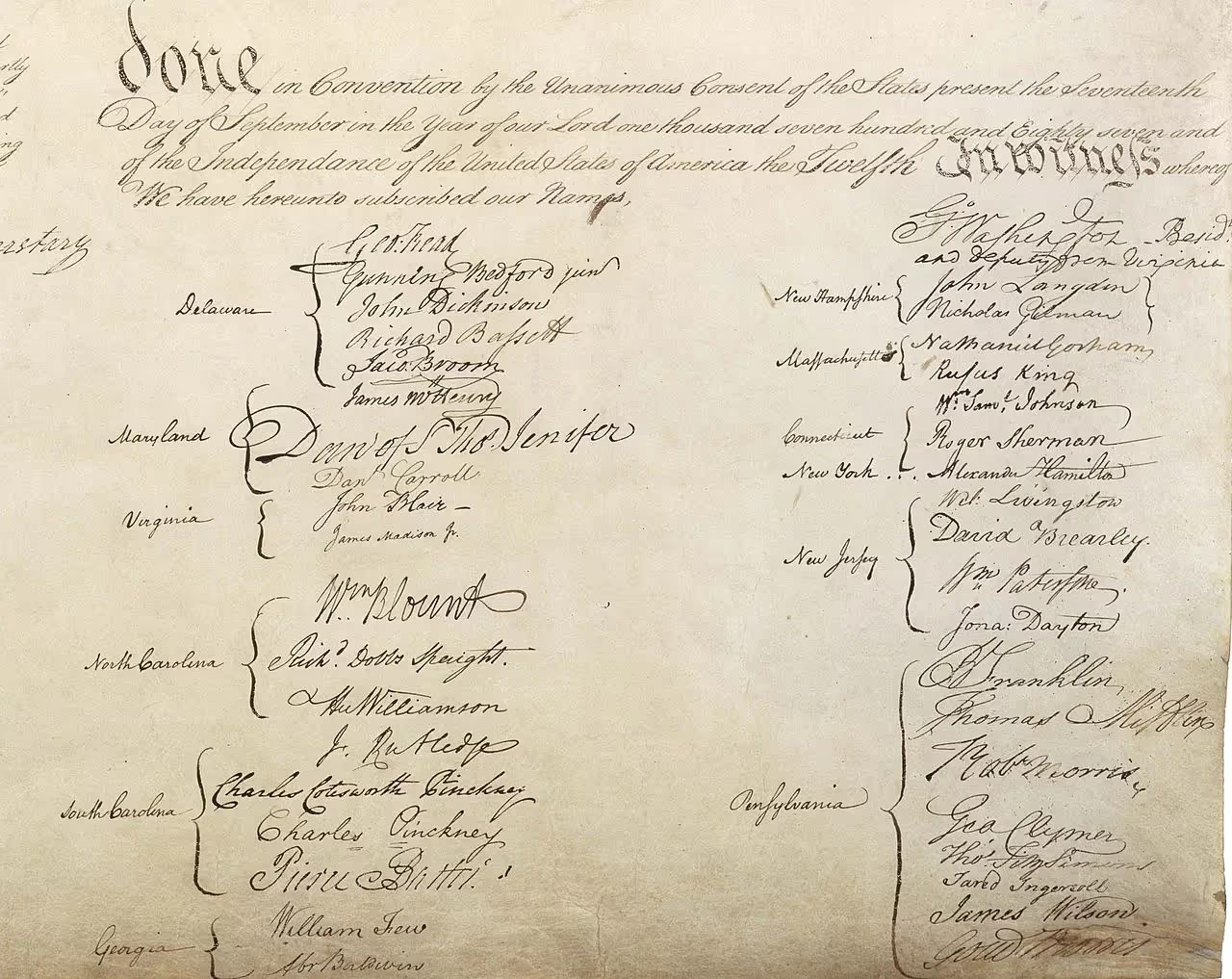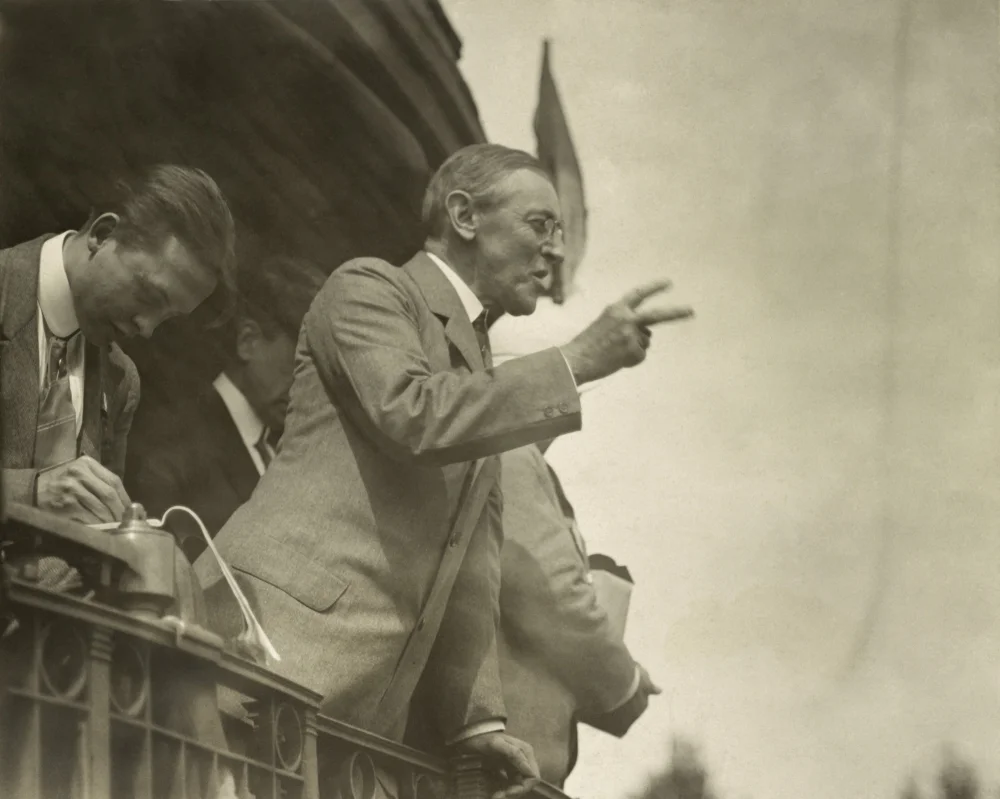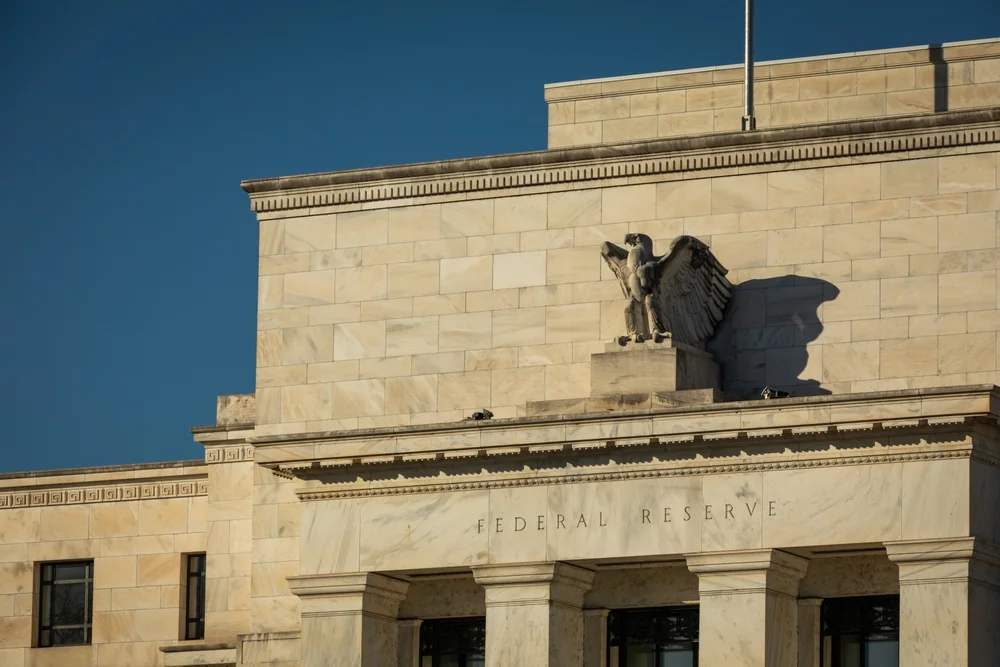
What Americans Mean By “Constitution”
Nowhere in previous world history do we have a record of the word “constitution” (or an equivalent) ever being used to mean this precise thing that Americans have agreed it means for the past 249 years.
Editor's Note: An earlier version of this essay was delivered as a Constitution Day lecture at the University of Dallas in 2025.
As we celebrate Constitution Day, I have been struck that Americans today remain remarkably unanimous in our definition of the word “constitution.” Across all our political divides — across every debate about how our constitution could improve, or even whether we need an entirely new one — we still share a common understanding of what a constitution is and does. It is the very same understanding bequeathed to us by the American founding generation. And, even more strikingly, this understanding was brand new when they first began acting on it in 1776. Nowhere in previous world history do we have a record of the word “constitution” (or an equivalent) ever being used to mean this precise thing that Americans have agreed it means for the past 249 years.
The new American meaning of “constitution” became operative as soon as the newly independent American states began writing and adopting their own constitutions. Eleven years later, Federalists and Antifederalists debated whether the whole nation should also have its own constitution. Another year later, our new federal constitution embodied a compromise between many different views of how best to accomplish the tasks of a constitution. Yet there was zero disagreement between Federalists and Antifederalists about what those tasks are, or about what it would mean to say we do or do not have a national “constitution.” The definition had already become completely uncontroversial. And so it has remained for us through the centuries.
How We Got Our Constitutions
The Founders’ new definition of “constitution” had developed especially during the period from 1763–1776. Many American colonists were confident that the British Parliament was acting unjustly by taxing them without their consent and by threatening the right to trial by jury. Later, the Declaration of Independence would famously direct its chief scorn against King George III, but that was only because its authors had long since despaired of Parliament; they had been hoping until the end that the King might intervene to restrain Parliament’s already-manifest tyrannies. Our Revolution, and hence American constitutionalism, arose out of a debate over the rightful limits on the legislative power of government — unlike the last British revolution of 1688, where the main issue had been limits on the executive power.
The American colonists in the 1760s and early 1770s were caught off guard by Parliament’s new actions, and they were agitated. As tends to happen to all of us in such circumstances, they were certain they were victims of an injustice, but stammered when they tried to describe its nature. Decades later, John Adams and James Madison each privately admitted that the Americans in those pre-Revolutionary debates had often been unclear and inarticulate about exactly what was wrong with Parliament’s actions toward them. Yet in retrospect, among the various and conflicting theories that began to circulate in colonial pamphlets and newspaper articles (during what we now call the Imperial Crisis), a few common themes were emerging.
First, the colonists insisted that their own colonial founding documents had promised them the same basic civil rights as their fellow subjects in Great Britain. Second, they considered those rights to be not only legal but constitutional: they were supposed to be part of the British constitution that all British subjects had inherited from their ancestors, while Parliament was supposed to uphold that constitution rather than overturn it. Finally, they also insisted that these constitutional rights were not merely a matter of ancestral inheritance. They thought the British political heritage was itself an objectively good thing because it secured rights that had a deeper foundation in the nature of justice itself — in what many authors might call the natural law, the will of God, the nature of man, or some related concept.
The prominent colonial authors made many arguments that combined and recombined these common themes in various ways. They were trying to persuade the London Parliament. In this, they failed badly. Yet within what was quickly becoming the politically active class of the newly independent American republics, those same arguments completely carried the day. So far as we can tell, these arguments were an indispensable part of what made our thirteen colonies sufficiently united to declare independence together.
That recent history with Parliament was very much on the mind of these former colonists when they sat down to write their first state constitutions in 1776 and thereafter. When you read those constitutions, I think you can see that their drafters expected these documents to play, now in our new American politics, the very same role they had wished (in vain) for their own colonial founding documents to play in the politics of the late British American Empire. That is, the new Americans wanted each state constitution to be a written statement of the limits of their own government — of its basic structure, and of their own basic rights against it — which they could then appeal to whenever that government should misbehave. This would apply even and especially if their legislatures should misbehave. For they had seen and felt that the legislature is the most dangerous branch in a republic: the problems from Britain had come from Parliament because Parliament was in charge of Britain.
Parliament had decisively won its own battle against George III’s ancestors, and George III had no desire to reawaken that quarrel. Each new state, like Great Britain, would be dominated by its elected legislature. At a minimum, then, we should have an agreed-upon standard to appeal to whenever that legislature starts overstepping its bounds and violating what we believe are our sacred civil rights.
Readers of the Federalist Papers will immediately want to ask: even once we do write down a standard setting bounds to the legislature, what if the legislature should ignore it? What good are “parchment barriers”? Yet this crucial question could barely have been raised in American political thought before 1787. Until 1776, no one had even agreed on such a written standard. There was no historical precedent for calling such a standard a “constitution.”
In Great Britain, the word “constitution” had meant something largely unwritten. Or to the extent that the British constitution was indeed written down (e.g., in the 1689 Bill of Rights), it had been written down by Act of Parliament. Among British thinkers in 1776, even the most pro-American — and these ranged across the British political spectrum, from Edmund Burke to Richard Price — did not believe that their British constitution set any clear bounds to the power of their own supreme legislature. It is hardly an exaggeration to say that America was born out of the colonists’ refusal to accept that previous, British definition of “constitution.”
What We Mean By “Constitution”
Since then, every single American author whom I have ever read—from the authors of the state constitutions, through the Federalists and Antifederalists, and marching right down to today, from Ibram Kendi to John Eastman and everyone in between — has shared a single common understanding of the word “constitution.” And I am unaware of a single thinker outside of America before 1776 who shared the same understanding. Here is that shared American understanding, in eight short points.
1. A constitution gives voice to a whole political community in its collective decision about how to govern itself. It represents the will of the people as a whole—not (as John Locke had claimed) the will of a bare majority. A constitution can therefore be adopted only by a supermajority of the voting public. It logically follows that a constitution will be ancestral: even if 51% of us this year are tired of our ancestors’ old constitution, we will still be stuck with it until we get a much broader consensus on what to replace it with. From there, it is only another small step to add what we see in many American constitutions: a constitution can (and probably should) contain procedures for its own amendment by a supermajority.
2. Because a constitution thus embodies the collective will of the whole community and not of a bare majority, it is the only source of any legitimate political power within that community. This includes power won by popular election: elections are not self-justifying but can take place only by authority of the constitution and within constitutional bounds. Hence, the constitution is always more important than the results of any one election. (From here to Marbury vs. Madison is a very short step.)
3. A constitution describes the entire form of a government. It “constitutes,” not only the legislative branch, but also the executive and the judiciary. Because these other two branches enjoy direct constitutional authority, they are not only distinct from the legislature but independent of it — except insofar as the constitution grants to the legislature some authority over the staffing of the other branches (through the impeachment process, e.g.). This may seem obvious to Americans, but it flagrantly violates the old British theory of absolute parliamentary supremacy, which was apparently shared by every eighteenth century British thinker from Locke to Burke. By 1776, the American patriots were positively gagging on that British theory, and they decisively rejected it when writing their constitutions.
4. In constituting all three branches of government, a constitution has to explain how their officeholders will be selected. It thus necessarily summarizes the basic political rights of citizens: who gets to vote on what issues, and who will be eligible for which offices (including juries). Where a constitution does not do this explicitly — as, for example, our federal constitution neglects to say anything about who has the right to serve on federal juries — it instead delegates that decision to one of the political authorities that it constitutes. Or alternatively, it may simply assume that the new government will continue the practices of the last government in place before this new constitution (i.e., the pre-Revolutionary colonial governments). A constitution does not make the world anew. I believe that every early state constitution, and certainly the federal constitution, makes at least some explicit reference to continuing inherited British-American governmental institutions that preceded it.
5. A constitution also enumerates at least some individual civil rights, which not even the legislature has the power to violate (e.g., the right to trial by jury). Here, I do not mean inalienable natural rights: I have never heard anyone suggest that humans have an inalienable natural right to trial by jury. The American theory is instead that when our ancestors formed a constitution, they freely chose to retain certain rights, which thus became part of positive constitutional law (not natural law) and so remained permanently beyond the grasp of the legislature. Early Americans often described this withholding of rights in terms of social contract theory. But insofar as they did, this was a new take on social contract theory — one that no theorist outside of America had ever articulated before 1776, to my knowledge.
6. Every American constitution has also always included some kind of preamble, sketching our community’s collective understanding of the legitimate purposes that this government is supposed to serve. Some of these preambles get rather philosophical, speaking of the state of nature and/or of natural human rights. Others, like that of our federal constitution, are much more down-to-earth. Either way, the assumption is that we collectively accept certain truths about the nature and purpose of government that are, at a minimum, not equally self-evident to all human beings. They are evident to us. And we want them to be drilled into our unborn descendants so that the same truths will remain equally evident to them.
7. Every American constitution includes some general statements about, not only the rights and powers of our various public offices, but also the positive duties of the officeholders (e.g., “he shall take care that the laws be faithfully executed”). It thus includes statements about the purposes of our government that are expected to guide officeholders without always being (fully) justiciable. It is indeed a basic law, but it is also more than a law.
8. Every American constitution also includes some provisions for holding our various officeholders to account if they should misuse those offices. This means that a constitution is expected to hold the country together even after a given government has abused its trust. The constitution does not dissolve (as Locke, again, had claimed a constitution does) the moment that its highest government officials act contrary to the people’s trust.
In light of these eight points about what a constitution is and does, you can easily see why the Americans thought a constitution should be written down. Even if an unwritten constitution might in principle be able to fulfill all the functions that I’ve just listed, it is pretty clear that once “constitution” has been defined in this way, we would rather have a written than an unwritten one. And that, indeed, has become the practice of almost all new governments founded throughout the world after 1776. Some of those new written constitutions have been much better than others, to be sure. But nearly all of them seem to aspire to something much closer to the American definition of “constitution” than what we would have found in any non-American thinker before 1776.
I have not even tried to defend the American definition here, so I will close with just one point in its favor. There is an ancient preference within Western civilization for the rule of law over and against the rule of human beings. That preference was compellingly articulated and defended by Plato and his disciples throughout the history of Western thought, from Cicero and Augustine to Aquinas and Calvin to Tocqueville and beyond. A written constitution, in the American sense, offers a powerful way of trying to secure that same preference under modern political conditions.
A written constitution tries to make sure that no one, not even the people’s elected representatives, can ever be above the law. I think it does this significantly better than the previous British theories of parliamentary supremacy could have done.
Our country has accomplished something amazing in the history of human self-government. Our ancestors invented something that the rest of the world has rightly admired. We need to learn to better appreciate their achievement.
Daniel E. Burns is associate professor of Politics at the University of Dallas and a fellow at the Catholic University of America’s Institute for Human Ecology.
Constitutionalism

Amicus Brief: Hon. William P. Barr and Hon. Michael B. Mukasey in Support of Petitioners
Former AGs Barr and Mukasey Cite Civitas in a SCOTUS Brief

Rational Judicial Review: Constitutions as Power-sharing Agreements, Secession, and the Problem of Dred Scott
Judicial review and originalism serve as valuable commitment mechanisms to enforce future compliance with a political bargain.

Supreme Court showdown exposes shaky case against birthright citizenship
Supreme Court will hear challenges to Trump's order ending birthright citizenship, testing the 14th Amendment's guarantee for babies born in America.


.avif)










.avif)





